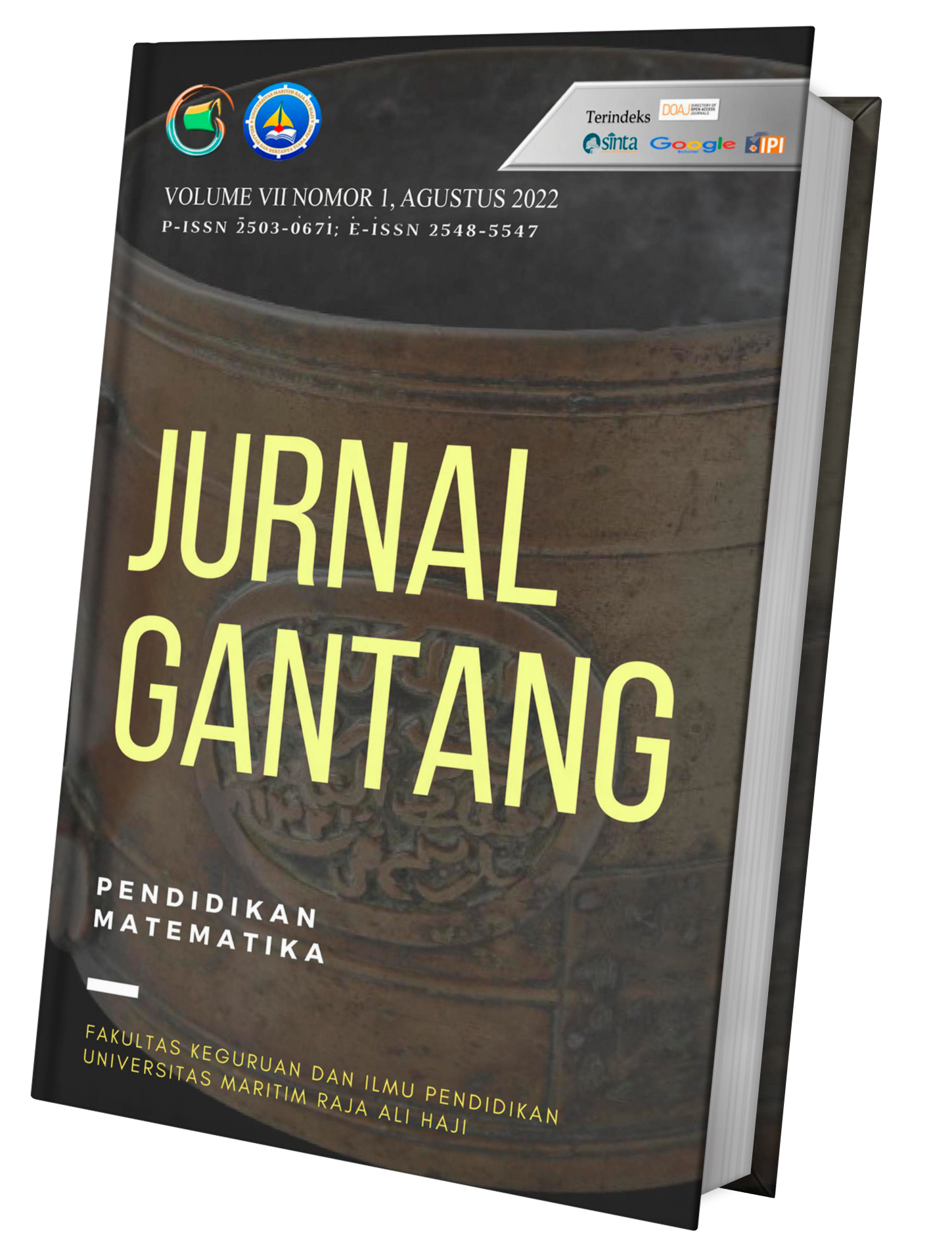Inquiry-Based Student Worksheet Design for Introduction to Mathematical Statistics Course
DOI:
https://doi.org/10.31629/jg.v7i1.4500Keywords:
student worksheet, inquiry, combinatorialAbstract
In the new normal, learning is carried out online. For this reason, educators must be able to package the learning activity interactively so that students have the motivation to learn. The inquiry method facilitates students to be active in learning. Students are guided through the questions arranged in the Worksheet. Therefore, this study aims to develop an Inquiry-Based Student Worksheet in the Introduction to Mathematical Statistics in the New Normal Era. The development model used is 4D with the stages of define, design, develop, and disseminate. However, the stages of this article are defined and designed. The instrument used in the define stage is a questionnaire. The results at the define stage are that teaching materials are needed to help students find concepts, and the Student Worksheets are one of the teaching materials that have a good impact on learning.
Downloads
References
Anita, Rina Agustina, Y. R. E. (2022). Pengembangan lembar kerja peserta didik (lkpd)berbasis inkuiri terbimbing berbantu alat peraga pada materi peluang. EMTEKA: Jurnal Pendidikan Matematika, 3(1), 98–108.
Ayu K, K. R., & Perwira Negara, H. R. (2019). Worksheet persamaan differensial untuk meningkatkan kemandirian belajar mahasiswa. JTAM | Jurnal Teori Dan Aplikasi Matematika, 3(2), 149. https://doi.org/10.31764/jtam.v3i2.1045
Chen, Y. C., Pan, Y. T., Hong, Z. R., Weng, X. F., & Lin, H. S. (2020). Exploring the pedagogical features of integrating essential competencies of scientific Inquiry in classroom teaching. Research in Science and Technological Education, 38(2), 185–207. https://doi.org/10.1080/02635143.2019.1601075
Cooper, T., Bailey, B., Briggs, K., & Holliday, J. (2017). Assessing student openness to inquiry-based learning in Precalculus. Primus, 27(7), 736–753. https://doi.org/10.1080/10511970.2016.1183155
Dudu, W. T., & Vhurumuku, E. (2012). Teachers’ practices of inquiry when teaching investigations: a case study. Journal of Science Teacher Education, 23(6), 579–600. https://doi.org/10.1007/s10972-012-9287-y
Dwinata, A., & Ramadhona, R. (2018). Analisis kesalahan siswa dalam pemecahan problematika kaidah pencacahan titik sampel. Jurnal Gantang, 3(2), 117–126. https://doi.org/10.31629/jg.v3i2.479
Ernst, D. C., Hodge, A., & Yoshinobu, S. (2017). What is inquiry-based learning? Notices of the American Mathematical Society, 64(06), 570–574. https://doi.org/10.1090/noti1536
Indriani, M., Niswah, C., & Arifin, S. (2017). Pengembangan Lembar Kerja Peserta Didik (LKPD) berbasis inkuiri terbimbing pada materi transformasi geometri. Jurnal Pendidikan Matematika RAFA, 3(2), 165–180. https://doi.org/10.19109/jpmrafa.v3i2.1739
Laursen, S. L., Hassi, M. L., & Hough, S. (2016). Implementation and outcomes of inquiry-based learning in mathematics content courses for pre-service teachers. International Journal of Mathematical Education in Science and Technology, 47(2), 256–275. https://doi.org/10.1080/0020739X.2015.1068390
Miller, N. (2017). Teaching inquiry to high school teachers through the use of mathematics action research projects. Primus, 27(1), 33–46. https://doi.org/10.1080/10511970.2016.1199616
Muchsin, S. B., Kamaruddin, R., & Razak, K. (2018). Pengembangan LKM Geometri Analitik Bidang Berbasis. 2(22), 206–221.
Mutlu, A. (2020). Evaluation of students' scientific process skills through reflective worksheets in inquiry-based learning environments. Reflective Practice, 21(2), 271–286. https://doi.org/10.1080/14623943.2020.1736999
Pedaste, M., Mäeots, M., Siiman, L. A., de Jong, T., van Riesen, S. A. N., Kamp, E. T., Manoli, C. C., Zacharia, Z. C., & Tsourlidaki, E. (2015). Phases of inquiry-based learning: Definitions and the inquiry cycle. Educational Research Review, 14(February), 47–61. https://doi.org/10.1016/j.edurev.2015.02.003
Perdana, S. A., & Ramadhona, R. (2022). Pengembangan buku ajar berbasis inkuiri untuk mata kuliah statistika pendidikan di masa new normal. Jurnal Gantang, 6(2), 185–193. https://doi.org/10.31629/jg.v6i2.4114
Prastowo, A. (2013). Panduan kreatif membuat bahan ajar inovatif. DIVA Press.
Rahmadhani, E., & Wahyuni, S. (2020). Integrasi pembelajaran matematika berbasis ICARE dan Islam pada materi pecahan. JNPM (Jurnal Nasional Pendidikan Matematika), 4(1), 110. https://doi.org/10.33603/jnpm.v4i1.2874
Ramadhona, R., & Izzati, N. (2018). Pengembangan lembar kerja mahasiswa berbasis inkuiri mata kuliah matematika umum untuk mahasiswa pendidikan kimia. Jurnal Kiprah, 6(2), 21–24. https://doi.org/10.31629/kiprah.v6i2.780
Ransom, M., & Manning, M. (2013). Teaching strategies: Worksheets, worksheets, worksheets. Childhood Education, 89(3), 188–190. https://doi.org/10.1080/00094056.2013.792707
Roliza, E., Ramadhona, R., & Rosmery, L. (2018). Praktikalitas lembar kerja siswa pada pembelajaran matematika materi statistika. Jurnal Gantang, 3(1), 41–45. https://doi.org/10.31629/jg.v3i1.377
Rooney, C. (2009). How am I using inquiry-based learning to improve my practice and to encourage higher-order thinking among my students of mathematics ? Educational Journal of Living Theories, 5(2), 99–127.
Sanjaya, W. (2011). Strategi Pembelajaran Berorientasi Standar Proses Pendidikan. Kencana Prenada Media Group.
Sari, R. M., Rusdi, R., & Maulidiya, D. (2019). Penerapan model pembelajaran inkuiri terbimbing untuk meningkatkan aktivitas matematika peserta didik kelas vii smp negeri 2 kota Bengkulu. Jurnal Penelitian Pembelajaran Matematika Sekolah (JP2MS), 3(1), 31–39. https://doi.org/10.33369/jp2ms.3.1.31-39
Stender, A., Schwichow, M., Zimmerman, C., & Härtig, H. (2018). Making inquiry-based science learning visible: the influence of CVS and cognitive skills on content knowledge learning in guided Inquiry. International Journal of Science Education, 40(15), 1812–1831. https://doi.org/10.1080/09500693.2018.1504346
Sutawidjaja, A. (2011). Pembelajaran matematika. Universitas Terbuka.
Suvriadi Panggabean, H. S. (2018). Pengaruh metode drill terhadap hasil belajar matematika siswa SMP Pertiwi Medan. Jurnal MathEducation Nusantara, 1(1), 89–96. https://jurnal.pascaumnaw.ac.id/index.php/
Trianto. (2010). Mendesain model pembelajaran inovatif dan progresif. Prenada Media Group.
Umriani, F., Suparman, Hairun, Y., & Sari, D. P. (2020). Analysis and design of mathematics student worksheets based on pbl learning models to improve creative thinking. International Journal of Advanced Science and Technology, 29(7 Special Issue), 226–237.
W A Basuki and A Wijaya. (2018). The Development of student worksheet based on realistic mathematics education. Journal of Physics: Conference Series, 1742(1). https://doi.org/10.1088/17426596/1742/1/012018
Yasin, M., Jauhariyah, D., Madiyo, M., Rahmawati, R., Farid, F., Irwandani, I., & Mardana, F. F. (2019). The guided Inquiry to improve students mathematical critical thinking skills using student's Worksheet. Journal for the Education of Gifted Young Scientists, 7(4), 1345–1360. https://doi.org/10.17478/jegys.598422
Yerizon, Y. (2019). Pengembangan lembaran kerja matematika SMP berbasis pendekatan metakognisi untuk meningkatkan higher order thinking skill peserta didik. Jurnal Gantang, 4(2), 143–153. https://doi.org/10.31629/jg.v4i2.1418


















